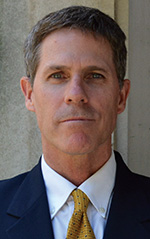Playing Squash with Arlen Specter
Reflections
BY ALEXIS LUDWIG
Word went out from on high that someone from the embassy community was needed to play squash with Senator Arlen Specter, then a Republican from Pennsylvania, who was scheduled to make a brief stop in Guatemala City in early 1996. Wherever the senator happened to travel, whether at home or abroad, someone always was; an hour or so set aside in his schedule for squash was an absolute requirement. This was non-negotiable.
Washington Post columnist Al Kamen had even made snarky note of the senator’s disciplined daily squash habit—and the commandeering of partners required to accommodate it. But no matter. The senator was undeterred by mere gossip.
Specter was up and coming at the time. Several years earlier, his aggressive cross-examination of Anita Hill during the confirmation hearings for Supreme Court Justice Clarence Thomas had thrust him into the national limelight, and he had emerged as a formidable force in the Senate since. “Snarlin’ Arlen” his colleagues reportedly called him. Treat him right, or watch out!
It seems somehow fitting that I can’t quite recall what official purpose brought Mr. Specter, who was then chair of the Senate Intelligence Committee, to Guatemala. What I do remember were the embassy’s exhaustive efforts to find him the right squash partner. Should it be someone from inside or outside the mission? Local or American? Was a level of English required, or just a certain threshold of skill at the sport? This was serious business, and we had to get it right.
In the halls of the chancery and over lunch in the cafeteria, conversations turned to strategy. Should I seek to win, or allow the senator to do so? Should I ensure a tough struggle, deliberately drawing it out? Or show unambiguous dominance, to underscore some larger political point?
Thinking back, I don’t remember how or why I was the one chosen in the end. I’m sure I didn’t exactly volunteer. Probably a combination of the pickings being slim and the first and second choices being out of town that day. I had played squash from time to time some years before as a graduate student, and had held my own against other okay players. But what if the senator was one of the exquisitely skilled, a member of the fearsome squash elite? What then?
I had had a previous experience with this element, in the form of a thorough thrashing at the hands of a fellow graduate student—the aptly named Angus, from Oxford. I had come to think of myself as pretty decent at squash … until I faced Angus. His dominance of the pivotal T-area was total and complete, his movements on the court focused, economic and spare.
Angus held the long narrow racket expertly low, parallel to his side and, with a quick succession of barely visible flicks of the wrist, sent the small, hot, black ball spinning with a stunning accuracy and precision of placement just above the red tin and invariably skipping and skidding shallow, fast and far out of my disheveled reach for the easy kill. He couldn’t even try to pretend to keep me in the game. I was a rank amateur playing chess against Bobby Fischer. It was over before it began.
If Senator Specter was anything like Angus, I thought to myself, I was toast, and the embassy’s reputation for excellence possibly in tatters. I lost some sleep, but I kept my crackling doubts locked up inside.
Meanwhile, in the halls of the chancery and over lunch in the cafeteria, conversations turned to strategy. Should I seek to win, or allow the senator to do so? Should I ensure a tough struggle, deliberately drawing it out? Or show unambiguous dominance, to underscore some larger political point? Pluses and minuses were offered on both sides.
It turned out to be a legitimate hard-scrabble battle.
The assumptions being made struck me as flawed, deceived by appearances. In my early 30s at the time, I was a good athlete and still in my physical prime. Senator Specter was more than twice my age, and on a different curve in life’s arc entirely; he was not yet stricken by the cancer that felled him years later, but still. Advantage Ludwig, the thinking went.
The point turned out to be moot.
We met in the locker room, minutes before the match was to begin. I was still lacing my tennis shoes when he walked in. I saw an opportunity for an exchange of pleasantries, but the good senator was having none of it. His focus was elsewhere. I’m not even sure we shook hands. I quickly understood that, for him, this episode would be about the squash and the squash alone. Conversation would play no role. Fine.
It turned out to be a legitimate hardscrabble battle, with lots of running and sweating, a succession of momentum shifts and many tough points fought down to the wire. There was no reason to play it one way or the other, just to play it. Thank God! All told, we were evenly matched. The senator had the advantages of technique, rhythm and experience, as well as the clear desire to win; I had stamina, speed and athleticism on my side.
Let the record show that I was recovering from a chest cold at the time, which caused me to get winded more easily than I might have otherwise. I had also been away from the courts for a number of years, and was out of practice. As a result, I blew a series of potentially easy kills. Apart from that, for good or ill, Senator Specter beat me fair and square.
Perhaps that’s why he shook my hand before he bid me “adios,” turned, and headed for the showers.



